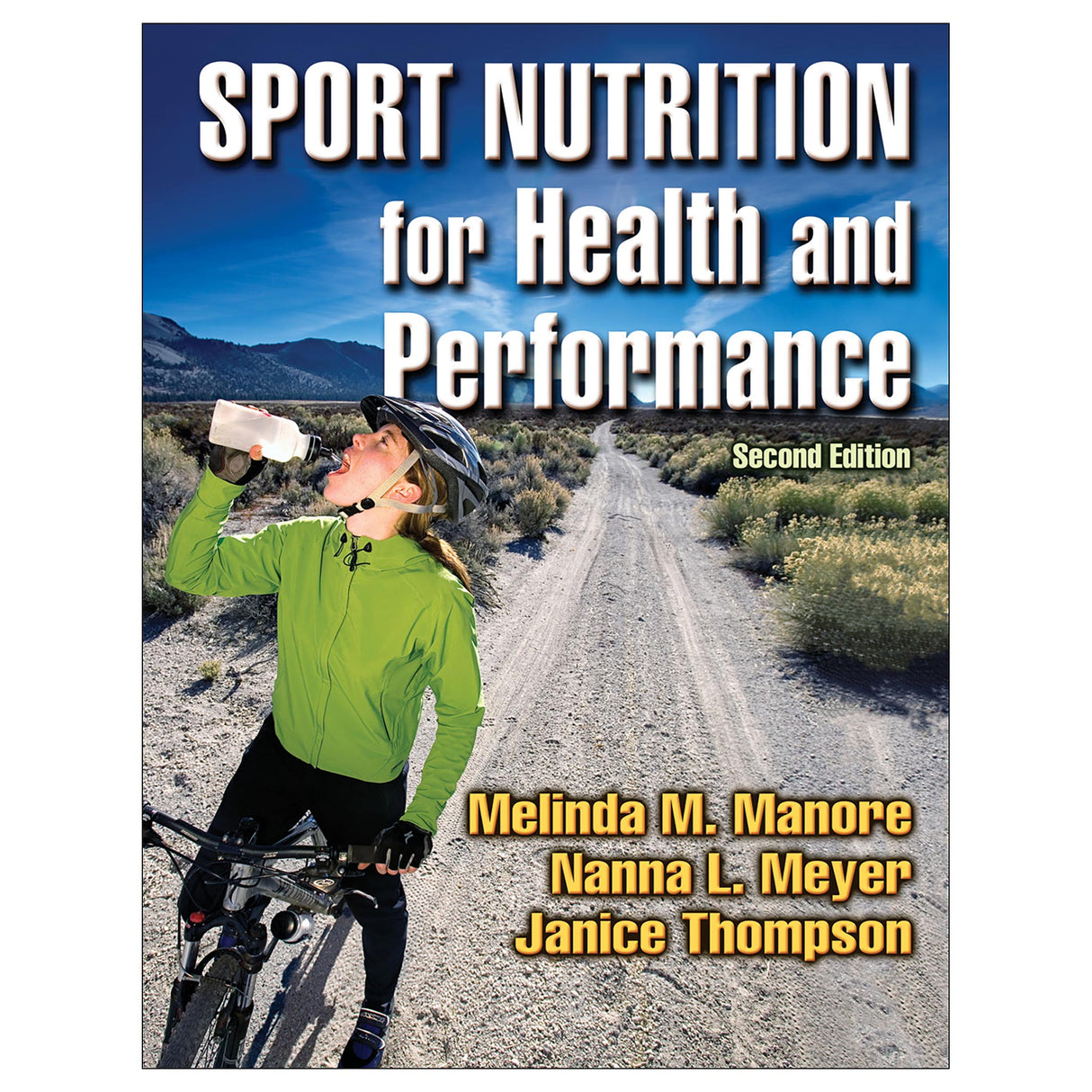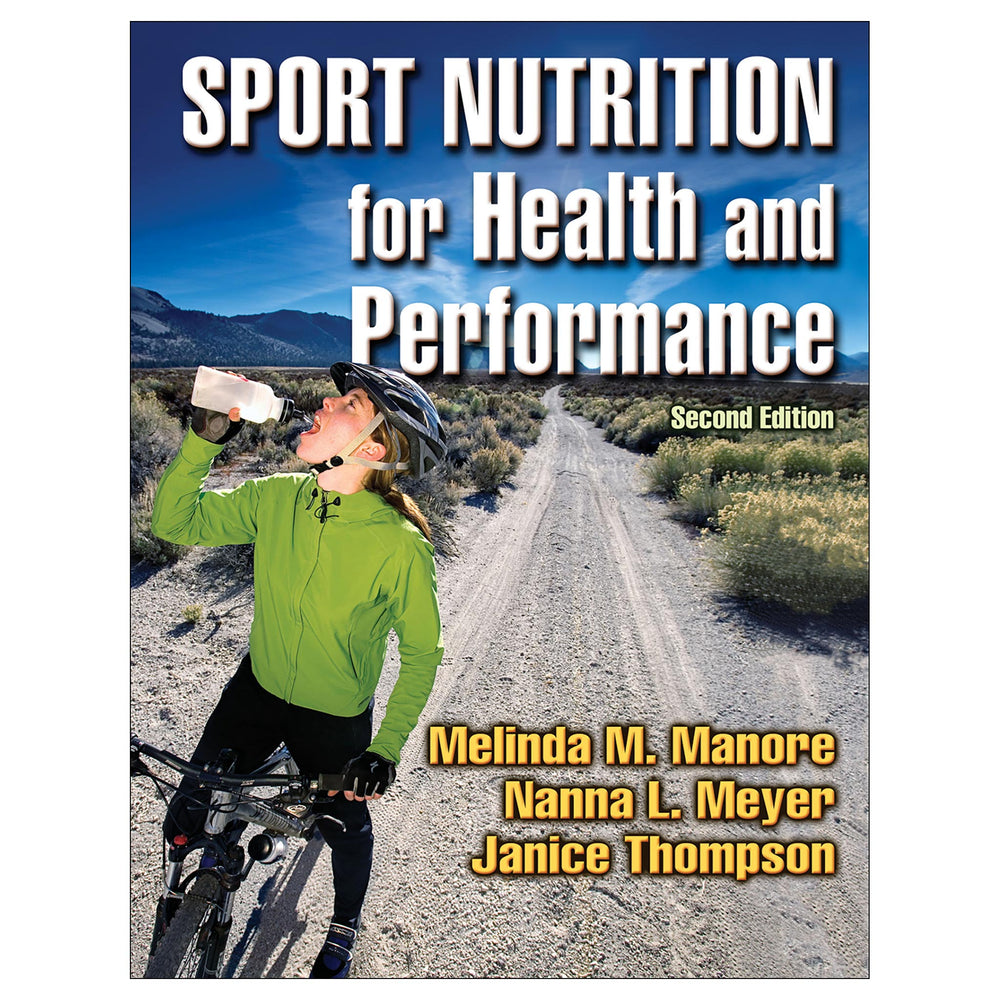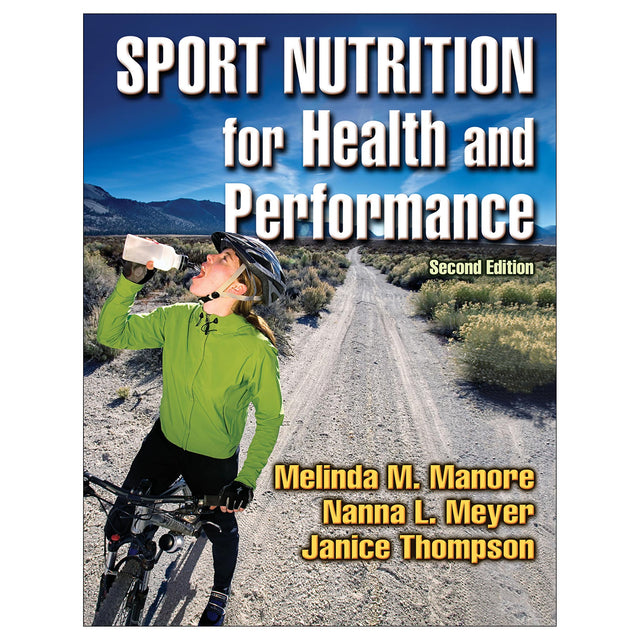Sport Nutrition for Health and Performance-2nd Edition
$143.95 CAD
Sport Nutrition for Health and Performance, Second Edition, will help students and practitioners understand the function of the nutrients in the body and how these nutrients affect health and athletic performance. The authors present clear, comprehensive, and accurate nutrition information that may be applied to a variety of careers. The text provides students with practical knowledge in exercise and nutrition science, and it keeps practitioners on the cutting edge of current research and practices in the field.
Using the authors' extensive backgrounds in nutrition, exercise physiology, and fitness, the text combines micronutrients into functional groupings to provide an easy framework for understanding how these nutrients can influence exercise performance and good health for both athletes and active individuals. This unique presentation allows readers to fully understand why proper nutrition helps athletes prevent injury, enhance recovery, improve daily workouts, and maintain optimal health and body weight.
This second edition has been thoroughly revised and updated to reflect the latest issues, guidelines, and recommendations for active individuals. Chapters dealing with macronutrients and micronutrients have been entirely rewritten, and all chapters have been revised to reflect the latest Dietary Reference Intakes, USDA Food Guide Pyramid, Food Pyramid for Athletes, Dietary Guidelines for Americans, and physical activity recommendations from various organizations, including the 2008 Physical Activity Guidelines by DHHS. Following are some of the current topics discussed in the text:
-Carbohydrate recommendations for athletes before, during, and after exercise
-Protein requirements of athletes based on the latest research
-Updated evaluation of the fat needs of athletes and the role of fat loading
-An evidence-based reexamination of various diets and techniques used for weight loss
-New research on body composition assessments and standards
-The latest on controversial nutrition issues such as the role of protein, vitamin D, and energy in bone health and new criteria for assessing bone health in young adults
-New nutrition and fitness assessments, questionnaires, and methods for measuring energy expenditure
-Updated information on various topics such as the issues of the active female, ergogenic aids, energy balance, and fluid balance
Sport Nutrition for Health and Performance, Second Edition, has also been improved with an attractive two-color format, new artwork, and a slimmer design that allows the text to maintain the content while reducing “backpack bulge.” The text also includes an online image bank that instructors may use to create customized PowerPoint presentations using artwork, tables, and figures from each chapter. In addition, a variety of features help readers comprehend the material presented, including chapter objectives, key concepts and key terms, additional information to learn more about a topic, and references. Chapter highlights provide in-depth information on topics and critically evaluate issues regarding myths and controversies in sport nutrition.
This book provides readers with clear, authoritative content that will help them understand the scientific basis of nutrition and make sound recommendations in their careers. With up-to-date content based on current guidelines, Sport Nutrition for Health and Performance, Second Edition, is an outstanding text for both students and practitioners concerned with achieving good health and maximizing performance.
Audience
Text for upper-undergraduate or graduate students in nutrition, exercise physiology, and kinesiology programs. Reference for fitness professionals, dietitians, health fitness specialists, and sports medicine specialists.
Chapter 1. Introduction to Nutrition for Exercise and Health
Role of Nutrition in Exercise and Sport
Essential Nutrients and Dietary Recommendations
Role of Eating a Balanced Diet
Role of Nutrition and Exercise in Disease Prevention
Chapter in Review
Learning Aides
Chapter 2. Carbohydrate as a Fuel for Exercise
Function, Classification, and Dietary Sources of Carbohydrate
Carbohydrate Metabolism During Exercise
Carbohydrate Reserves and Dietary Intake
Carbohydrate Feeding Before Exercise
Carbohydrate Feeding During Exercise
Carbohydrate Feeding Postexercise and During Training Periods
Muscle Glycogen Supercompensation
Chapter in Review
Learning Aides
Chapter 3. Fat As a Fuel for Exercise
Function, Classification, and Dietary Sources of Fat
Body Fat Reserves and Dietary Fat Intake
Fat Metabolism During Exercise
Enhancement of Fat Oxidation
Dietary Fat Recommendations for Optimal Performance and Health
Chapter in Review
Learning Aides
Chapter 4. Protein and Exercise
Functions and Classifications
Methods of Assessing Protein Status
Dietary Sources of Protein
Metabolism of Protein During and After Exercise
Dietary Protein Recommendations for Active Individuals
Chapter in Review
Learning Aides
Chapter 5. Energy and Nutrient Balance
Energy and Macronutrient Balance Equations
Macronutrient Balance
Energy Expenditure
Energy Intake
Chapter in Review
Learning Aides
Chapter 6. Achieving Healthy Body Weight
Role of Diet and Exercise in Achieving a Healthy Body Weight
Weight Loss Interventions
Adding Exercise to Weight Loss Programs
Recommendations for Maintaining or Gaining Weight
Weight Concerns of Athletes
Chapter in Review
Learning Aides
Chapter 7. Body Composition
Body Composition and Health
Body Composition and Sport Performance
Body Composition Assessment Models and Methods
Accuracy of Body Composition Assessment Methods
Selection Criteria for Field Methods
Body Composition of Athletes
Body Composition Standards and Health
Chapter in Review
Learning Aides
Chapter 8. Fluid and Electrolyte Balance
Water and Electrolyte Balance
Fluid and Electrolyte Recommendations for Exercise
Sport Drinks and Fluid Replacement Beverages
Fluid Needs in Hot Environments
Fluid Needs in Cold Environments
Fluid and Electrolyte Needs for Children and Adolescents
Chapter in Review
Learning Aides
Chapter 9. B Vitamins Important in Energy Metabolism
Exercise-Related Functions and Dietary Requirements
Rationale for Increased Need for Active Individuals
Assessment of Vitamin Status
Exercise and Vitamin Requirements
Vitamins and Exercise Performance
Chapter in Review
Learning Aides
Chapter 10. Antioxidant Nutrients
Actions of Antioxidants
Enzymes Involved in Antioxidant Activities
Nutrients Involved in Antioxidant Activities
Assessment of Oxidative Damage
Rationale for Increased Antioxidant Need Among Active Individuals
Antioxidants and Chronic Diseases
Antioxidants and Performance
Chapter in Review
Learning Aides
Chapter 11. Minerals and Exercise
Exercise-Related Functions, Dietary Requirements, and Food Sources
Assessment of Mineral Status
Rationale for Increased Need for Active Individuals
Nutritional Status of Active People
Chapter in Review
Learning Aides
Chapter 12. Micronutrients Important in Blood Formation
Exercise-Related Functions, Dietary Requirements, and Food Sources
Rationale for Increased Need for Active People
Assessment of Vitamin and Mineral Status
Nutritional Status of Active Individuals
Chapter in Review
Learning Aides
Chapter 13. Nutrients for Bone Health
Review of Bone Metabolism
Calcium
Phosphorus
Magnesium
Vitamin D
Other Nutrients Involved in Bone Metabolism
Exercise and Bone Health
Chapter in Review
Learning Aides
Chapter 14. Nutrition and Fitness Assessment
Medical and Health History Questionnaires
Assessing Energy and Nutrient Intake
Assessing Daily Energy Expenditure
Fitness Assessment
Chapter in Review
Learning Aides
Chapter 15. Nutrition and the Active Female
Energy and Nutrient Requirements
Female Athlete Triad
Chapter in Review
Learning Aides
Chapter 16. Ergogenic Substances
Ergogenic Substances in Sport and Exercise
Evaluating Ergogenic Substances
Choosing Quality Ergogenic Substances
Review of Two Ergogenic Substances
Chapter in Review
Learning Aides
Appendix A. Nutritional Recommendations
Appendix B. Artificial Sweeteners and Fat Replacers
Appendix C. Energy Balance
Appendix D. Body Fat Percentages for Athletes
Appendix E. Nutrition and Fitness Assessment
Index
About the Authors
“This informative book provides excellent explanations, especially of the metabolism of carbohydrate, fat, and protein in exercise.”
--Doody’s Book Review, 5-star review
Evaluating popular diets
Evolution of Dietary Guidelines for Americans
Learning from the National Weight Control Registry
Image bank. Features more than 300 full-color PowerPoint slides that contain most of the figures, content photos, and tables from the text, sorted by chapter. The images can be used in developing a customized presentation based on specific course requirements. A blank PowerPoint template is also provided, along with easy-to-follow instructions for quickly creating a presentation.





